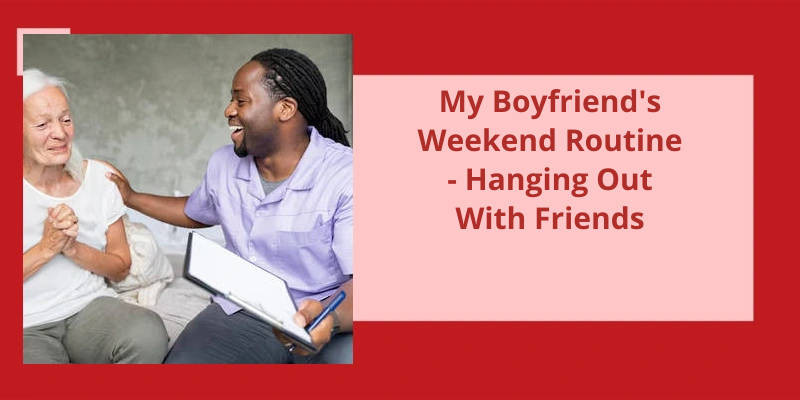Why Do I Feel Like I’m Annoying My Girlfriend?
It’s a common feeling to feel like youre annoying your girlfriend, even when she reassures you otherwise. This feeling often stems from your own insecurities and lack of confidence, which can make you doubt yourself and your place in the relationship. When you constantly think that you’re bothering her, it shows that you’ve a tendency to overthink and overanalyze your actions and their impact on her.
Moreover, this feeling might also stem from your constant consideration of your girlfriends feelings and opinions. When you care deeply about someone, it’s natural to want to make them happy and avoid causing any discomfort. However, this can sometimes lead to excessive worry about saying or doing the wrong thing, which can create feelings of annoyance or burden.
Understanding the root causes of these feelings is important in order to navigate your relationship frustrations. Developing self-confidence and a strong sense of self-worth can help alleviate the constant fear of annoying your girlfriend. It’s essential to recognize that you’re deserving of love and acceptance just as much as she is.
Communication is key in any relationship, so it’s important to open up and express your feelings with your girlfriend. Honest conversations about your insecurities and concerns can help clarify any misunderstandings and reassure both of you of your love and commitment to each other.
Remember that relationships are a two-way street, and your girlfriend has her own responsibilities in the relationship as well. It’s important for both partners to mutually support and understand each other. Working together to navigate these frustrations can strengthen your bond and create a healthier, more fulfilling relationship.
Common Signs of Insecurity in Relationships and How to Address Them
Common signs of insecurity in relationships can include constant need for reassurance, jealousy, possessiveness, and mistrust. These behaviors can create tension and frustration in the relationship. It’s important to address these insecurities in a healthy way to maintain a strong and loving bond.
Open and honest communication is key to addressing insecurities. Both partners should be willing to express their feelings and concerns without judgment. This allows for understanding and empathy to grow between the couple.
Building trust is crucial. Encouraging transparency and being reliable can help alleviate insecurities. It’s important for both partners to create a safe and supportive environment where they feel comfortable expressing their thoughts and emotions.
Working on self-esteem is also important. Encouraging self-love and self-care can help address underlying insecurities. It’s essential to remind each other of their worth and support one another’s personal growth.
Lastly, seeking professional help from a couples therapist can provide additional guidance and tools to address insecurities in the relationship. Therapy can offer a neutral space to explore deeper issues and develop healthier patterns of communication.
Why Do You Get Irritated at Someone You Love?
In relationships, it’s normal to feel irritated at times, even with someone you love deeply. The truth is, our increased dissatisfaction with our loved ones has a lot to do with what we give our attention to and how we experience what we see and perceive. Anyone can become really irritating if all we focus on and give our energy to on a regular basis are their perceived flaws and annoying habits.
When we love someone, our expectations for them may be higher than for other people. We may hold them to a different standard or have certain ideals in mind for how they should behave or respond in various situations. When they don’t meet these expectations, annoyance can creep in. Instead of appreciating their efforts, we may become fixated on their shortcomings.
Furthermore, relationships are complex and can be emotionally charged. We invest so much of ourselves into them that when things don’t go as planned or conflicts arise, irritation can easily arise. We may become frustrated when our partner doesn’t understand our perspective or fails to meet our emotional needs. These frustrations can build up over time, causing us to feel annoyed even with the smallest actions.
Moreover, we all have our own unique sensitivities and triggers. What may seem insignificant to one person can be incredibly irritating to another. These triggers can stem from past experiences, insecurities, or personal preferences. It’s important to recognize that these triggers are subjective, and it may not be the other persons fault that they’re annoying to us. They may simply be unwittingly activating our sensitive areas.
However, it’s essential to remember that no one is perfect, including ourselves. We all have flaws and annoying habits. It’s crucial to practice empathy and understanding, to communicate openly and honestly about our frustrations, and to find a balance between acceptance and growth. Sometimes, the very things that irritate us are an opportunity for personal growth and learning within the relationship.
In navigating relationship frustrations, it’s important to shift our focus from the negatives to the positives. Instead of dwelling on what annoys us about our loved one, we can redirect our attention towards their strengths, their loving gestures, and the positive aspects of our relationship. By doing so, we can cultivate a sense of gratitude and appreciation, which can help alleviate irritation and strengthen the bond between us. Remember, love is a journey, and it requires effort and understanding from both parties to navigate the inevitable irritations that arise.
Now that we’ve discussed some signs that your partner may be annoyed with you, it’s important to understand what relationship experts suggest you can do about it. Paying attention to hidden meanings behind their jokes, addressing defensiveness, finding ways to improve communication, and creating quality time together are just a few strategies that can help mend the situation and strengthen your relationship.
How Do You Know if You Are Annoying Your Girlfriend?
When it comes to relationships, it’s normal to experience some frustrations and annoyances. However, it’s essential to understand the signs that your girlfriend may be annoyed with you and how you can navigate those feelings to maintain a healthy connection. One clear indication that your partner may be irritated is when their jokes start having hidden meanings. If their sense of humor becomes subtly sarcastic or passive-aggressive, it could be a sign of underlying annoyance.
Another red flag is when your girlfriend frequently becomes defensive during conversations. If she consistently reacts with defensiveness or insecurity, it might indicate that shes feeling frustrated and unheard. This defensive behavior can hinder effective communication and prevent the resolution of underlying issues. It’s crucial to create a safe space where both of you can express your feelings and concerns without fear of judgment.
Moreover, if your girlfriend often forgets to respond to your texts or calls, it could suggest that she’s intentionally avoiding communication or finding it burdensome. This behavior can be frustrating and leave you feeling ignored or unimportant. In such cases, it’s essential to have an open and honest discussion about your expectations regarding communication and find a compromise that suits both of you.
Additionally, if your girlfriend seems emotionally absent or distant when you spend time together, it could indicate that she feels disconnected in the relationship. This can manifest as a lack of interest or engagement in conversations or activities you used to enjoy together. It’s vital to address this issue and make an effort to reconnect on an emotional level. Engage in activities you both enjoy, have meaningful conversations, and express your affection and love for each other.
Ultimately, clear and honest communication is key to navigating relationship frustrations. Express your concerns, listen to each others perspectives, and work together to find solutions. Remember, relationships require effort, compromise, and understanding. By being proactive and attentive to each others needs, you can strengthen your bond and overcome any annoying moments that arise along the way.
Strategies for Overcoming Relationship Frustrations
- Effective communication
- Active listening
- Expressing emotions
- Seeking professional help
- Quality time together
- Developing trust
- Building empathy
- Setting boundaries
- Practicing forgiveness
- Working on self-improvement
Source: Getting [M/24] easily annoyed by my girlfriend [F/24] lately …
Conclusion
In conclusion, navigating the frustrations that arise within a relationship can be challenging, especially when our loved ones possess qualities that annoy us. However, the key to maintaining a healthy and loving partnership lies in our ability to communicate openly, understand each other's perspectives, and practice patience and empathy. Recognizing that love isn’t always a smooth journey and that annoyances are a natural part of any relationship will guide us towards growth and stronger connections. Instead of viewing these annoyances as obstacles, we can embrace them as opportunities for personal development and the strengthening of our bond. Ultimately, love is a rollercoaster ride of emotions, and while our frustrations may test us, they also allow us to deepen our love and appreciation for our partners.






